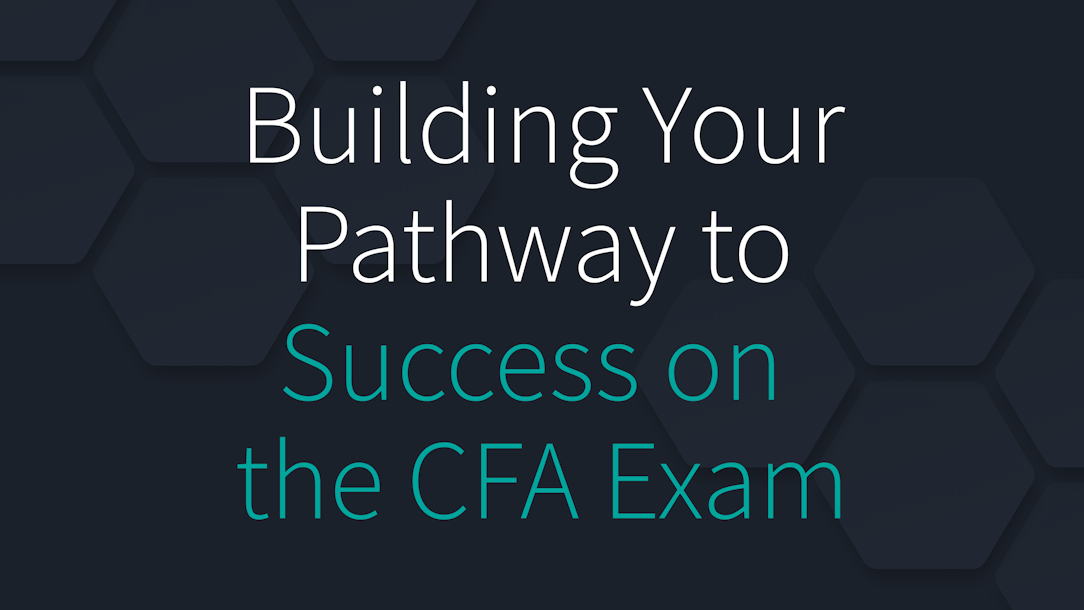
Building Your Pathway to Success on the CFA Exam
Mastering the CFA exam requires a strategic approach, high-quality study materials, and consistent effort.
Earning the Chartered Financial Analyst (CFA) designation is a milestone that can significantly elevate your career in finance. However, the journey is rigorous, requiring dedication, strategic preparation, and the right resources. The CFA exam isn’t just about knowledge—it’s about endurance, application, and precision. To help you navigate this challenge effectively, we’ve outlined a structured approach to mastering the exam.
Understanding the CFA Exam Structure & Requirements
The CFA program consists of three levels, each designed to test different competencies:
- Level I: Focuses on foundational financial concepts, ethical standards, and analytical tools.
- Level II: Emphasizes asset valuation, financial reporting, and complex investment concepts.
- Level III: Tests portfolio management strategies and the application of financial theories in real-world scenarios.
With the transition to computer-based testing, candidates must also familiarize themselves with the new exam format, including multiple-choice questions, vignette-style questions, and constructed responses at Level III. Staying updated with curriculum changes and understanding topic weightings is crucial to allocating study time effectively.
Creating a Personalized CFA Study Plan
Success in the CFA exam hinges on a disciplined study plan. Here’s how to structure yours:
- Set Clear Goals: Establish a realistic timeline based on your exam date and daily commitments.
- Identify Your Learning Style: Whether you prefer reading textbooks, watching videos, or practicing problems, choose study materials that align with your strengths.
- Stay Consistent: Aim for at least 300+ hours of study per level, breaking it into manageable daily sessions.
- Adapt When Necessary: Be flexible with your plan—adjust based on progress, weaknesses, and mock exam performance.
A well-organized plan ensures steady progress without last-minute cramming.
Essential CFA Exam Prep Resources
The right study materials can make or break your preparation. Here’s what you should consider:
- Official CFA Curriculum: Comprehensive but lengthy—best for deep dives into concepts.
- Third-Party Providers: Condensed study notes, video lectures, and practice questions streamline learning.
- Practice Exams & Q-Banks: Reinforce concepts through mock exams, adaptive question banks, and interactive learning tools.
Combining multiple resources ensures you cover every angle of the exam.
Mastering CFA Exam Study Techniques
The CFA exam isn’t just about memorization—it’s about application. These study techniques can sharpen your understanding:
- Active Learning: Engage with the material through practice problems, real-world applications, and discussion forums.
- Summarization & Mind Mapping: Condense large topics into concise notes or visual mind maps.
- Spaced Repetition: Reinforce retention by revisiting key concepts periodically rather than in one sitting.
By studying smart, candidates can enhance comprehension and recall.
The Role of Practice Exams & Performance Tracking
Mock exams are essential to gauge readiness and refine time management. A strategic approach includes:
- Taking full-length mock exams under timed conditions.
- Analyzing mistakes to identify recurring weak areas.
- Adjusting your study focus based on test performance.
Consistently tracking progress and adapting your strategy is key to mastering the CFA exam.
Time Management Strategies for CFA Candidates
Balancing CFA preparation with professional and personal commitments can be challenging. Here’s how to maximize efficiency:
- Prioritize High-Weight Topics: Allocate study time based on CFA Institute’s topic weightings.
- Use Short Study Sessions: Break studying into 45-90 minute focused sessions.
- Avoid Burnout: Schedule periodic breaks and maintain a work-life-study balance.
A well-planned approach prevents last-minute stress and improves retention.
Exam Day Preparation & Test-Taking Strategies
Exam day can be nerve-wracking, but the right approach helps maintain composure:
- Know the Exam Format: Familiarize yourself with the question structure to avoid surprises.
- Time Allocation: Don’t linger too long on difficult questions—keep moving.
- Stay Calm & Focused: Use relaxation techniques to stay confident throughout the exam.
With proper preparation, exam day becomes an opportunity to showcase your knowledge rather than a stressful hurdle.
Post-Exam Strategy: What Comes Next?
Once the exam is over, candidates should:
- Evaluate Performance: Reflect on strengths and areas for improvement.
- Prepare for the Next Level: If advancing, build on existing knowledge with a targeted study plan.
- Leverage the CFA Network: Engage with industry professionals and explore career opportunities.
Conclusion
Mastering the CFA exam requires a strategic approach, high-quality study materials, and consistent effort. By understanding the exam structure, creating a personalized study plan, and using efficient study techniques, candidates can significantly improve their chances of passing. The key is smart preparation—not just hard work.
At Salt Solutions, we provide the most up-to-date CFA study materials to help you navigate each level of the exam. Whether you're preparing for CFA Level 1, advancing to CFA Level 2, or tackling CFA Level 3, our expert-designed courses and tools are built to optimize your study efficiency.
Explore our CFA Exam Prep Products for cutting-edge learning tools, and check out our CFA Exam Study Materials for comprehensive coverage of the latest curriculum.